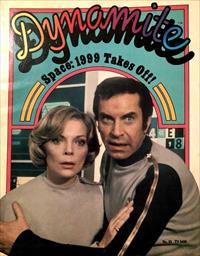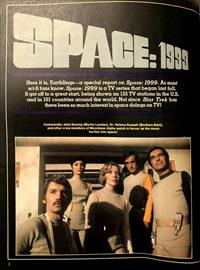Educational Press
Space: 1999 Takes Off


Author Unknown
Dynamite Magazine - Number 25, 1976, p2-4
Source Article Provided by: Robert Ruiz
Publisher Scholastic sold books and magazines through school book clubs in the USA. Dynamite magazine was created in 1974 and immediately became hugely popular for it's features on pop stars, TV and movies, as well as puzzles, jokes and comic reprints. Scholastic also published TV's Fabulous Faces, a book of features on 1977 TV, for the same audience. This was one of several publications for US schools which covered the series, including rival teenage magazine Smash from Xerox Education Publications, Weekly Reader, the Reader's Digest Science Fiction Top-Picks, and a Space: 1999 title from Xerox Education Publications.
Here it is, Earthlings- a special report on Space: 1999. As most sci-fi fans know, Space: 1999 is a TV series that began last fall. It got off to a great start, being shown on 155 TV stations in the U.S. and in 101 countries around the world. Not since Star Trek has there been so much interest in space doings on TV!
Right now the cast and crew of Space: 1999 are in London working on next season's shows. Dynamite's spies sneaked around until we found out there are quite a few changes planned!
Starting this fall, Moonbase Alpha is taking on a new resident. She's a strange alien who can change herself into a bird, or any other animal or creature. (Eat your heart out, Mr. Spock!) To make room for the newcomer, Space: 1999 is losing one cast member. Say goodbye to Professor Victor Bergman (Barry Morse). He will be killed off in the first episode this fall. The learned professor is going to die of mechanical heart failure. It's too bad, but let's face it, the new alien does sound like a lot more fun!
Of course, the stars, Martin Landau and Barbara Bain, will be back this season. The husband and wife team told Dynamite that they're as enthusiastic as ever about the show. "Most science fiction deals with people running around in Buck Rogers suits looking silly," Landau told us. "Our shows are more involved and imaginative. The shows aren't set that far in the future, so the characters still have today's viewpoints and emotions. And yet the adventures take us into far-out worlds. Sometimes we come into contact with civilizations that are a million years ahead of us!"
For those of you who aren't yet fans of Space: 1999 maybe we'd better fill you in on some of the background. The series takes place on the moon on Moonbase Alpha. The base was set up to do research and is staffed by over 300 men and women from all over the world. They were sent there to study. They didn't plan to stay there the rest of their lives. However...
Back on Earth, getting rid of atomic waste had become a major problem. So the Earthlings decided to store it on the moon. Unfortunately, as the waste built up reactions started. Finally a series of explosions blasted the moon (with the base on it) right out of the Earth's orbit. Space: 1999 tells the story of the people who are marooned on the base, drifting through space, never to return!
"We never get back in touch with Earth as we know it." Landau explained. "There we are, headed further out into space. We're not prepared for the journey. We didn't plan to spend the rest of our lives together. We have a life-support system, but it doesn't allow for anything extra. We can just about survive!"
Sound exciting? It is, especially since Moonbase Alpha is always running into all kinds of strange space beings and environments. "Last season, we got into blinding snowstorms," Barbara Bain said. "We got involved in interplanetary wars. You see, we have no control over the path we're travelling, so anything can happen!"
Last season, almost everything did! The stories were as far out as the Moonbase. In one show an alien spaceship locked Alpha into an orbit and then stole classified information from its data banks. In another, a strange force made everyone appear to be duplicated. It was weird, especially when one Moonbase resident became convinced she was living in her own future!
Could any of this happen in the real world? Landau thought about the question and then said: "It is possible that we may use the moon as a nuclear waste dump. And the idea of a shuttle bus between the Earth and the moon is really planned. And it is certainly possible that there is life in some form in outer space."
Barbara Bain agreed. "I think it's ridiculously conceited of us to think that we are the only life in the universe. Who's to say that there aren't other beings in totally different environments?"
"Working on this show has been an incredible experience," Landau told us. "The scripts make you think, and the producers have spared no expense. We worked for 20 months to make the first 24 shows." (Most TV shows work much faster in order to save money. They do 24 shows in six months.)
The expense and work has paid off. Even though Space: 1999 is not on one of the three [American] networks, it is so popular that sometimes it has more viewers than the network shows. "There's a worldwide appetite for TV shows that are different," a series spokesperson told us. "That's why we're spending over seven million dollars on shows for next season."
It's definitely been an exciting year for Space: 1999. Sure, the folks of Moonbase Alpha have had their share of monsters, disasters, interplanetary wars, and such. But for the most part, being marooned in a hit TV series hasn't been such a bad adventure after all!
Photo captions:
Cover Photo:
Space: 1999 copyright ITV Studios Global Entertainment
Thanks to Robert Ruiz